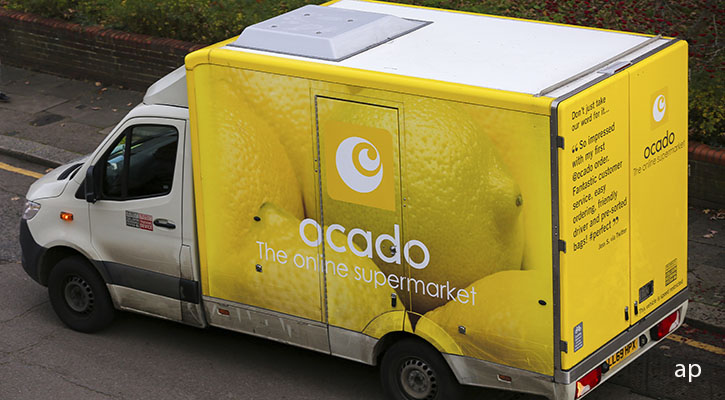
Shares in Ocado (OCDO) surged on Tuesday as investors selectively focused on some encouraging numbers from the online grocer’s half-year results.
Just five months after the group’s shares lost 10% after it reported a £500 million full-year loss, shares rose 10% on Tuesday after its latest numbers showed an 8% increase in revenue and 30% rise in earnings on the same period in 2022.
By some measures the latest results beat market expectations but the outlook and guidance were left unchanged from February’s final results.
The Backstory
After a difficult period for the company, investors were looking for signs of a breakthrough in profitability. Whether they got this or not depends on which accounting measure you choose.
Group EBITDA, which the company itself describes as an "alternative performance measure", came in at £16.6 million, compared to a loss by on this metric of £13.6 million in the first half of the 2022 financial year and forecasts for a loss this time.
This turnaround is tempered by a £289.5 million statutory loss in the first half, and that’s £78 million worse than the same period last year.
The company has also maintained its full-year guidance, so that’s not been the driver for the share increase – as so often happens when a company’s profitability is under scrutiny.
Morningstar analyst Ioannis Pontikis now argues today’s bounce is driven by improved dynamics within its Solutions business, rather than the customer-facing Ocado Retail division that UK consumers know.
Within the group EBITDA of £16.6 million, Technology Solutions brought in £5.9 million (up 110% on last year), Ocado Logistics £14.6 million (up just 0.7%) and Ocado Retail made a loss of £2.5 million (compared to profits of £31 million in last year's first half). Revenue growth at the Solutions business is now forecast to be 40% for the full year, significantly higher than for Ocado Retail.
"We believe upbeat commentary on operational progress with the largest and most important Solutions client (US firm Kroger) as well as better profitability in the Solutions segment in the first half are driving share outperformance this morning," Pontikis says.
Ocado updated investors on its partnership with Kroger, where Ocado has been trying to improve operational efficiency in their first two customer fulfilment centres (CFCs).
"There are promising initial results, such as significantly improved warehouse productivity," Pontikis notes. Here, Automation is key. That allows Ocado to increase the speed it picks groceries, the number of deliveries its vans can make and reducing waste and costs.
A new CFC is due to be opened in Luton in the second half of the year, the company confirmed, but there’s uncertainty about when new CFCs with retailer Coles will come online.
"While the EBITDA performance in 1H is better than expected, the potential delays to Coles CFCs could be seen negatively," UBS analysts said in a note this morning, describing the results as a mixed bag.
Even after the 50% increase in the share price over the last month, by Morningstar metrics Ocado remains significantly undervalued – and the £15.50 fair value estimate remains in place after the results, some way above the current price of £6.60.
Share Price Boom and Bust, But What Next?
Ocado shares have been volatile in the last five years.
Lockdowns assisted bulls' case for the stock, as well as the company’s status as a leading UK "tech" company, leading to strong gains in 2020, when it was the FTSE 100’s best performer.
From a high above £28 in early 2021, however, the share price has been on the slide since as technology fell out of favour in the rotation to value. Investors lost patience with loss-making UK companies in 2022, and that sentiment pushed shares to a low around £3.50 in June this year.
Since then they have risen by more than 50%, boosted by shortlived talk of takeover interest from Amazon, and the resurgence of ecommerce stocks globally. After such a choppy ride for investors, what’s the narrative for future growth?
We know UK consumers are under pressure financially, especially in the realm of food bills, and that has led to shoppers switching down to cheaper supermarkets. The takeover possibility may keep some investors interested in Ocado but "food delivered in vans" no longer has the novelty appeal of a great idea – especially as lockdowns mean that there are few shoppers left to try it it out.
"The great hope for Ocado shares is that they can license their technology to a broad audience around the globe rather than being just another UK supermarket," says IG chief market analyst Chris Beauchamp.
Marks & Spencer holds a 50% stake in Ocado Retail, so the company is affected by the wider retail environment in the UK.
"Ocado is a useful bellwether for the UK’s middle classes, and the extent of action needed to reinvigorate sales speaks to the significant challenges being faced in all corners of the economy," says Hargreaves Lansdown equity analyst Sophie Lund-Yates.
That being said, Ocado’s retail arm keeps growing – the number of customers rose 10% year on year to just under 1 million, and average order value is also rising (for retail nerds, the average number of items in a basket is stable at 44).
Unsurprisingly, there was no mention of possible Amazon interest in the results, though retail analysts are sceptical Amazon would need or want to buy Ocado outright.


























